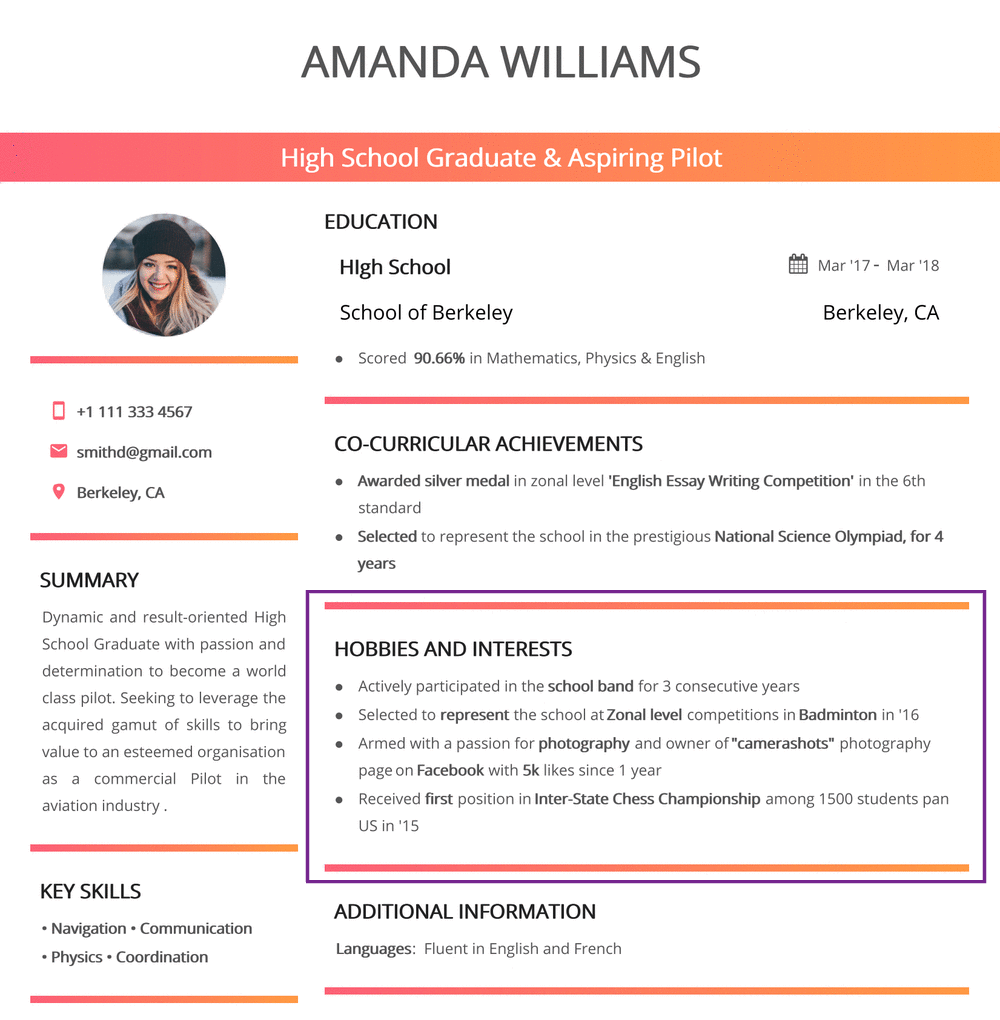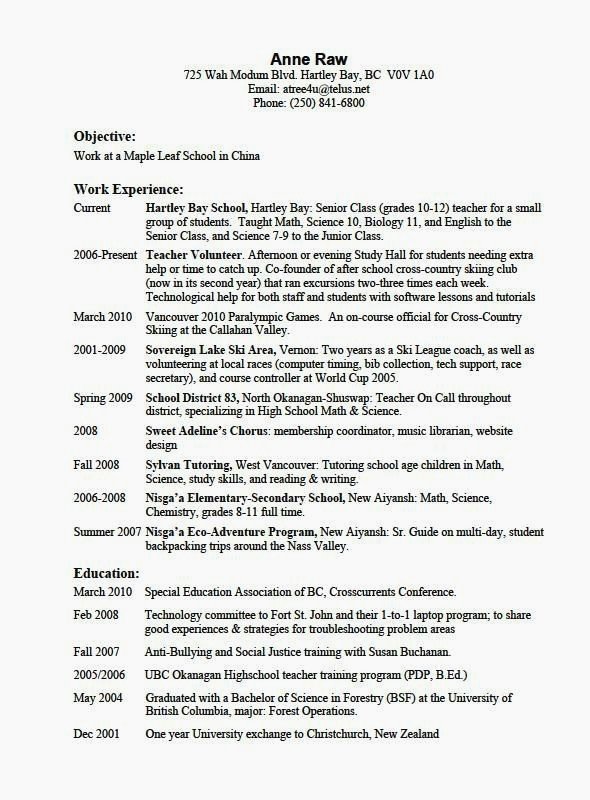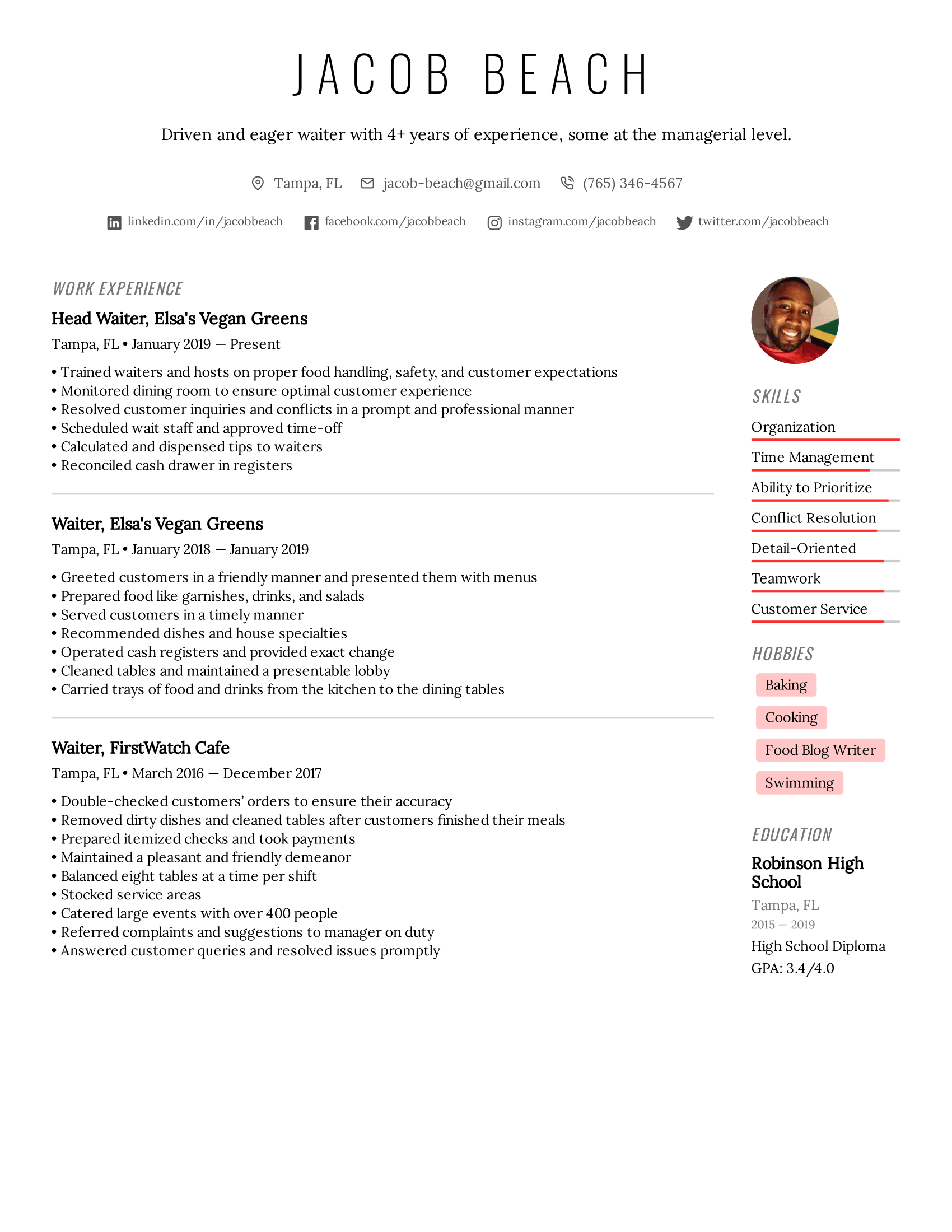So Should I Include Them
Essentially, theres no right or wrong answer for this one.
Some recruiters love the extra detail, whilst others prefer to keep it strictly professional. Their inclusion is never likely to grate on the reader too much, but should always be as relevant as possible. Especially if youre low on space. However, if your hobbies and interests are used to supplement your income, they could be a great way to demonstrate skills that may not be covered in your work experience section.
If youre still having difficulty making your decision, use our quick checklist below:
- Those applying for roles which are directly related to their hobbies
- Those who want to cut down their CV
- Those who dont know what to say
- Those who have no real hobbies
Should You Include Your Hobbies On A Resume
So you know what you should and shouldnt put in a personal interest section but is it really a good idea to include hobbies on a resume?
Lots of human resource and resume experts may maintain that including a section on your resume detailing your hobbies is perhaps unprofessional or they see personal interests as irrelevant for a job application, however with the worlds business culture evolving so rapidly, it could end up being the positive edge you need to convince a hiring manager to contact you.
Your resume is your first chance at showing a potential employer what you can offer their company and that doesnt just involve your professional experience and skills but also your expertise on a range of subjects, your passions and what makes you a good candidate for the role they advertise.
If you know you have what it takes to get the job but your experience is limited, you can use your personal hobbies in a way that demonstrate your abilities that make you the appropriate candidate.
The main purpose of including your personal interests in your resume is to stand out from other candidates in the application process, make yourself memorable to the hiring manager and show them a part of your personality that speaks to them as a human being.
This helps the company or hiring manager get to know you better as a person and not just another resume with the skills and qualifications the position requires.
Why Would Anyone Care If I Do Something Outside Work
- are dedicated that you don’t just do things out of duty but can do something extra” without being asked to
- are ambitious don’t want to do the bare minimum, you want to do more
- have a life outside of work people whose lives revolve only around their work get ill more often, have problems with concentrating everybody has to rest sometimes to give the job their all while they are working breaks, also in thinking about something, are simply healthy
- are an interesting person have broad interests and a lot to offer you never know when your love for traveling or interest in an unpopular language or breeds of dogs will be useful in your job.
Read Also: Is It Ok For Resume To Be 2 Pages
How To Find Good Hobbies To Add To A Resume
Some personal interests are not appropriate for a professional profile and should not be included in your resume. Follow these steps to find the best hobbies for your resume.
Before getting into how to write a hobbies section on your resume, you must prepare the types of personal interests or pastime activities you will list. The best method for finding good hobbies to add to a resume is by researching the sector, company and role you are applying for.
The following steps will show you how to make a list of the most suitable interests to have on your unique resume:
Good Hobbies And Interests To Include On Your Resume:

Blogging on a subject or published writings .
Part of an industry-relevant group or association .
Activities that show leadership in something .
Social/Charitable/Community Involvement .
Anything else that could be of relevance to the job. You can use both hard and soft skills to show an employer youâre the right fit for the job. Think about languages you know or skills you could teach to someone else.
Recommended Reading: What To Put On A Babysitting Resume
Do Not Choose Personally
When choosing hobbies to add to the resume, it is different than choosing a hobby for you.
Therefore, keep your personal preference aside and pay more attention to the company preferences.
For example, even though you love computer gaming as a hobby, it is good to choose another hobby to add the resume.
Cv Example With Hobbies And Interests
So, what would a typical CV with a dedicated hobbies and interests section look like?
Heres an example of a CV we put together, using one of our professionally designed and ATS-friendly templates, to give you an idea:
Want to try a different look? Stand out from the crowd with our 7-in-1 CV template bundle, plus get a free job application checklist! Get the bundle
Read Also: How To Write Resume In Word
The Difference Between A Hobby And An Interest
Although the terms hobby and interest often get used interchangeably, they are different. Interest is a more vague term. As an example, you might have an interest in baseball. You can watch games on television, follow statistics and cheer for a certain team, but simply liking the sport is not a hobby.
However, if you play for a team or coach Little League, then you can consider baseball a hobby because you participate in regular activities. Just because hobbies and interests are different, that does not mean you need two different sections for them on your resume. We will offer tips on how you can include both under the same section.
Why Include Hobbies And Interests
To put it simply, hiring managers are nosy.
While your CV tells the story of your qualifications and your career, the hobbies and interest section reveals a little more of your personality.
Benefits of including hobbies on your CV include:
- Demonstrating your relevant skills for the role
- Makes your CV more individual
- Allows you to show voluntary and community-focused projects
- Gives you something to talk about during your interview
Don’t Miss: How To Explain Leadership Skills On Resume
Show Your Personal Values
People are different from each other, and their preferences and values are different. Your personal values should be matched with the culture and the values of the company.
Therefore, recruiters will see your hobbies to get an idea about your preferences, interests, and values to find out whether the company will suit you or not.
Where To List Hobbies And Interests In Your Cv
Your work history, education and achievements should be the focal point of your CV. This means that if you choose to include hobbies and interests, they should always be placed at the very end of the document no matter your level of experience or which CV format youre using.
Youll need to separate these from everything else on your CV and create a designated section for them. Make sure to give the section an appropriate name, like Hobbies and Interests, as you would with your CVs other sections.
Read Also: Proficiency In Excel Resume
Outdoor Hobbies And Personal Interests On Resume
Outdoor hobbies and personal interests on a resume exhibit a personâs adventurous and risk-taking abilities.
They showcase a person’s nature of coming out of their comfort zone and working proficiently under pressure which is essential for administration and leadership positions.
Quick tip: This resume hobbies list might be a huge turn-off for a serious recruiter and work committed in fields like medicine. However, it makes you a good strategist who is adept at planning and getting the job done.
List of hobbies on resume or common personal interests on resume that is conducted outdoors:
| Hobbies on Resume |
|---|
| Rugby |
Bad Interests And Hobbies For A Resume

In contrast, here are some examples of interests and hobbies that should never be mentioned on a professional resume:
-
Napping
-
Eating ice cream
-
Scrolling through Instagram
You get the idea. Whereas each of the first five examples demonstrates an applicants willingness to improve and learn new things, the latter five examples convey the exact opposite impression.
As some additional general rules, you should avoid mentioning any interests or hobbies that:
-
Involve no interaction or cooperation with other people
-
Could be interpreted as unnecessarily dangerous
-
Are in any way illegal
-
Youre compensated for
-
Communicate sensitive personal information, such as your political affiliations, religious beliefs, or medical history
Then again, theres one more thing you can do.
Make a new resume and get more interviews.
Plus, a great resume will give you an advantage over other candidates. You can write it in our resume builder here. Heres what it may look like:
You May Like: Listing Classes On Resume
What Are Your Hobbies Funny Answers
Now that we know the serious things to mention in the interview question for What are your hobbies, here are some fun answers and memes you shouldnt take seriously!
Hopefully, this blog about how to answer what are your hobbies? has given you ample information to draft your unique answer. Need help with crafting an impressive resume? Sign up for an e-meeting with our Leverage Edu experts and we will help you in resume restructuring and profiling and getting you successfully selected for your dream job.
Leave a Reply
Examples Of Hobbies And Interests To List
Once youve decided to include hobbies and interests in your CV, its important that you choose the right ones particularly those that reflect positively on you, showcase the skills and qualities that employers look for, and help you demonstrate your overall fitness for the job.
Modupe Sarumi, a career transition coach and the founder of Learnable by Dr Mo, advises to always leverage hobbies and interests to your advantage: Avoid listing hobbies that portray you more as a liability and focus on ones present you as an asset.
Here are some good examples of hobbies and interests for your CV:
- Team sports like bowling or football
- Solo sports like cycling or swimming
- Artistic activities like drawing or photography
- Arts and crafts like DIY or sewing
- Knowledge-based activities like pub quizzes
- Creative activities like blogging or painting
- Outdoor activities like gardening or hiking
- Cultural interests like literature or cinema
- Academic interests like psychology or sociology
- Community activities like volunteering for a local charity
- Musical activities like singing in a choir or playing an instrument
And here are some bad examples to avoid:
You May Like: College Projects On Resume
What If I Have No Hobbies Or Interests That Are Relevant
Okay, you may be reading this and thinking âI canât think of any professionally relevant hobbies or interests that would fit in with my resume.â Relax!
If you canât find anything that would be of relevance, itâs just fine. How you spend your free time isnât the focus of your resume.
If you feel like you do need to add something, though, we have some suggestions.
-
Look for local organizations or associations in your field you can join
-
You can set up a website and blog on any topic in your industry
-
Volunteer your time, in person or online, to nonprofits with missions you care about. Many nonprofits need help with web development, social media, editing or writing blog content, or contacting volunteersâall things you can do from the comfort of your own home. Check out Volunteer Match to find something that matches your skills and interests!
Leveraging the right interests and activities can give you a leg up over the rest of the candidates.
How To Answer What Are Your Hobbies
How to Answer What are Your Hobbies?
Finding the best answer to What are your hobbies? can be difficult because you need to consider a plethora of things before answering this question. Firstly you must always mention hobbies of interest, which might not just include popular hobbies like reading and watching Netflix but go beyond that like playing a particular sport or collecting certain things like stamps, coins and so on.
Here is how to answer What are your hobbies?:
Read Also: Bilingual In Resume
List Interests At The Bottom Of Your Resume
You should always place your interests section at the bottom of your resume or off to the side, depending on your resume layout.
While listing interests on your resume can make you look more appealing as a candidate, its ultimately the least important information to include. Listing such information at the bottom of the page helps you avoid distracting employers from the more essential information on your resume, like your work experience and skills.
Where To Mention Interests And Hobbies On A Resume
In order for your list of interests and hobbies to have a maximally positive impact on your job application, its important to know exactly where to place them within a resume.
Mentioning them too early in your resume say, at the top of the page underneath your contact information will probably result in a hiring manager losing interest and moving on to the next job application.
A hiring managers time, after all, is very limited. First and foremost, they need to understand the most important details of your resume . Then, if all of that information checks out, theyll move on to reviewing your personal interests and hobbies.
In other words, the best place to mention your interests and hobbies is typically at the very bottom of your resume. That doesnt mean that this information is unimportant. On the contrary, its the perfect way to wrap up your resume on a high note that will stand out in a hiring managers mind.
Read Also: Good Reason For Leaving Job On Resume
Different Companies Need Different Hobbies For Resume
The classification presented in the sections above will help you pick hobbies and personal interests on resume. But sometimes, a company’s setting and work environment will matter the most.
Example: A company with a sports team that excels in tennis is likely to recruit you if you play tennis. This is because it will help the company maintain its image in the social and industrial setting.
However, it is improbable that these personal interests on resume will be given preference over required technical skills.
How To Write About Hobbies And Interests On Your Cv

The hobbies and interests section is one of the most overlooked and underutilised CV sections heres how to make yours stand out.
-
Chris Leitch
Editor-in-Chief and Career Expert
Never, ever include hobbies and interests in your CV that has been the golden rule for CV writing for decades now. But its a very narrow-minded rule. It doesnt take into account the many situations when mentioning your hobbies and interests can actually add value to your application.
Of course, were not talking about things like long walks on the beach your CV is not a dating profile, after all. Were talking about pastimes, activities and general interests that help you create a more rounded presentation of your skills and strengths and demonstrate your fit to the position youre applying for.
So, how do you write about hobbies and interests on your CV?
From when to include this section in your CV to how to mention your hobbies and interests, this guide has you covered.
Read Also: How Much Work History To Put On Resume
What Hobbies & Interests Should You Include In Your Resume
Your resume should be tailor-made to fit every job you are applying for. Instead of copying previous resumes, consider the job qualification expected, and include hobbies that display skills and personalities the employers may be looking for.
For example, is known to hire open and playful employees because, besides their educational qualifications, they would like to hire people that integrate into their culture.
However, according to the undercover recruiter, 50% of recruiters reject resumes due to clichés.
This means that your hobbies and interests should reflect the skills employers are looking for, without seeming obvious and boring.
According to the Business Insider, the following are hobbies and interests worth considering each of them is suitable for different job postings.
Yoga
Practicing yoga demonstrates an ability to remain calm and maintain control in all situations. It also shows a mastery of self and a deeper understanding of a persons emotions.
Jobs such as PR and advertising require control of emotions due to many inter-human interactions.
Work that also involves service delivery in hotels requires a mastery of emotions to avoid frustrating clients.
For example, a manager in a restaurant has to remain calm when addressing rude customers. If your job involves high human interactions, yoga is an excellent addition to your list.
Strategic Games
An interest in games like chess demonstrates that you enjoy thinking strategically.
Video Production
Extreme Sport